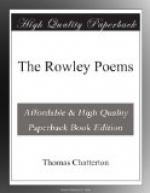6. ASTERTE. G. 137.
——You have theyr worthe asterte.
I despair of finding any authorized sense of the word asterte, that will suit this passage. It cannot, I think, signifie neglected or passed by, as Chatterton has rendered it.
7. AUMERE. AE. 398.—Ch. 7. AUMERES. E. III. 25.
Depycte wyth skylled honde upponn thie
wyde aumere.
And eke the grounde was dighte in its
mose deste aumere.
Wythe gelten aumeres stronge ontolde.
The only place in which I remember to have met with this word is in Chaucer’s Romant of the Rose, ver. 2271. and there it undoubtedly signifies a purse; probably from the Fr. Aumoniere. Aumere of silk is Chaucer’s translation of Bourse de foye. In another place of the same poem, ver. 2087. he uses aumener in the same sense. The interpretations given of this word by Chatterton will be considered below.
8. BARBED. AE 27. 219.
Nott, whan from the barbed horse,
&c.
Mie lord fadre’s barbde halle
han ne wynnynge.
Let it be allowed, that barbed horse was a proper expression, in the XV Century, for a horse covered with armour, can any one conceive that barbed hall signified a hall in which armour was hung? or what other sense can barbde have in this passage?
9. BLAKE. AE 178. 407.
Whanne Autumpne blake and sonne-brente
doe appere.
Blake stondeth future doome, and
joie doth mee alyse.
Blake, in old English, may signifie either black, or bleak. Chatterton, in both these passages, renders it naked; and, in the latter, some such signification seems absolutely necessary to make any sense.
10. BODYKIN. AE 265.
And for a bodykin a swarthe obteyne.
Bodekin is used by Chaucer more than once to signifie a bodkin or dagger. I know not that it had any other signification in his time. Swarthe, used as a noun, has no sense that I am acquainted with.
11. BORDEL. E. III. 2.—AE 147. BORDELIER. AE 410.
Goe serche the
logges and bordels of the hynde.
We wylle in a
bordelle lyve.
Hailie the robber
and the bordelyer.
Though bordel, in very old French, signifies a cottage, and bordelier a cottager, Chaucer uses the first word in no other sense than that of brothel or bawdy-house; and bordeller with him means the keeper of such a house. After this usage of these words was so established, it is not easy to believe that any later writer would hazard them in their primitive sense.
12. BYSMARE. M. 95.
Roaringe and rolleyng on yn course bysmare.
Bismare, in Chaucer, signifies abusive speech; nor do I believe that it ever had any other signification.




